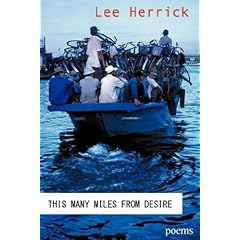

Lee Herrick's This Many Miles From Desire
Herrick, Lee. This Many Miles From Desire. WordTech Editions, 2007. (88 pages).
ISBN 978-1933456614
ISBN 978-1933456614
The title of Lee Herrick’s first collection, This Many Miles From Desire, suggests that the poetry contained within (this) will express the variable measures of desire. Desire, such a diffuse word, becomes a multi-dimensional theme as Herrick explores the many miles of desire—familial, relational, personal, geographic, musical, social, spiritual, etc. In short, each poem sounds as if it is saying “life life life deep like the water” (30).
One of the main currents of This Many Miles From Desire is adoption (as we learn in his bio, Herrick was born in Seoul, South Korea and adopted at eleven months). With titles like “Three Dreams of Korea: Notes on Adoption”, “Korean Adoptee Returns to Seoul”, “Korean Adoptee Daydreams”, “Korean Adoptee in Phnom Penh”, and “Korean Adoptee Thinks About Plants”, Herrick articulates a specific “Korean Adoptee” identity to capture and contour the desires of such an identity. From “Adoption music”:
I am learning to play the taiko, to feel
how leaves reappear in the trees with such ease.
One monk says this will teach me to hear
the variations of my name:
how my lover sighs it,
how a teacher grinded it out like a curse,
how your mother says it, drowning in a lake
before she leaves you. How it means somewhere
between mothers, not quite the rose
but not quite the roots. Like the woman
who finds you says, Lee, like a discovery—
one more child found in the world’s history
of found children. How she said it like the echo
of one plucked e string, a clear pang of delight. (14)
This poem revolves around both the various definitions of the word “lee” and the various articulations of Herrick’s name at different points in his life. The central line (“before she leaves you. How it means somewhere”) is especially striking because we are—at the lee of the line—abandoned in the image of a mother drowning after her departure; however, we can almost feel the wind in the word “somewhere” transport us to the “Lee” of the poem. By adopting and giving form to a “Korean adoptee” voice, Herrick teaches us to hear the variations in “the world’s history / of found children”. In “Korean Adoptee Returns to Seoul”, Herrick imagines his birth mother’s situation:
[…] Maybe
she was thirty and I took too much from her
busy life and she could not imagine death
so she left me on the steps of a church.
Maybe she was sixteen, and
I was heavy on her heart and on her back
so heavy that in her dreams, I could sink
quietly, in a lake. (29)
Even though this passage feels rather seamless, its emotional resonance feels entangled with the desire to know one’s origins. Herrick’s compassionate understanding of his birth mother’s possible situation perhaps expresses a further desire to know her through his poetry. As this poem continues, the smells of Seoul weave with the smells of Fresno (Herrick’s current home), creating a moment of correspondence:
I should mention how the sun tries to blaze there
like the sun tries to blaze here, how the son
finally rests having been home and smelled the city
and its possessions: the garlic fields, the rice fields,
and the woman’s hands mixing
the kimchi into the egg
How his heartbeat sounds as if it is saying life
life life life deep like the water
that connects these two cities
and the light breeze that blows in between. (30)
The movement from “there” to “here” and from “sun” to “son” sound a deep chord that connect distant places and bodies in the moment of the poem. Throughout this collection, we can hear the heartbeats of life echoing in between every word—“a song in the abandonment” (37), as Herrick phrases in the aptly titled poem, “Salvation”.
While reading This Many Miles From Desire, I start to believe that Herrick’s desire to find songs in the abandonment is a desire to salvage salvation. “A Thousand Saxophones”, a poem written after Hurricane Katrina, exemplifies this desire:
Sometime, tonight, see which echoes most—
a whisper or a scream. Make it something beautiful,
like, we will endure or Yes, I love you. Sometime,
tonight, think of water—how it purifies of terrifies,
cleanses, gives and takes away—think how fast
some things can rise—water, fear, the intensity of a prayer.
Officials in New Orleans said they want to save the living.
I hope they do. But I hope they also honor the dead.
On Bourbon Street, there were over 3,000 musicians employed
on any given day. Last night, before I fell asleep,
I imagined what a thousand saxophones
would sound like if they all played together […] (57)
Although “make it something beautiful” is quite different than “make it new”, Herrick manages to create new songs—beautiful songs—from the wreckage of life’s purifying, terrifying, and cleansing waters of experience. Maybe (to pose one of Herrick’s recurring syntactic and semantic devices) a thousand saxophones playing “different songs / different tempos” (57) would sound like the intense orchestra of poems that compose This Many Miles From Desire (the title itself perhaps suggesting a blues or jazz song title). In this emotionally resonant first book, Herrick’s poems echo across the traveled and untraveled distances of desire that words can only begin to measure.
C St Perez's reviews have appeared, or are forthcoming, in Pleiades, The Denver Quarterly, First Intensity, Rain Taxi, Jacket, and Rattle, among others. He blogs at blindelephant.blogspot.com.
Boxcar Poetry Review - ISSN 1931-1761